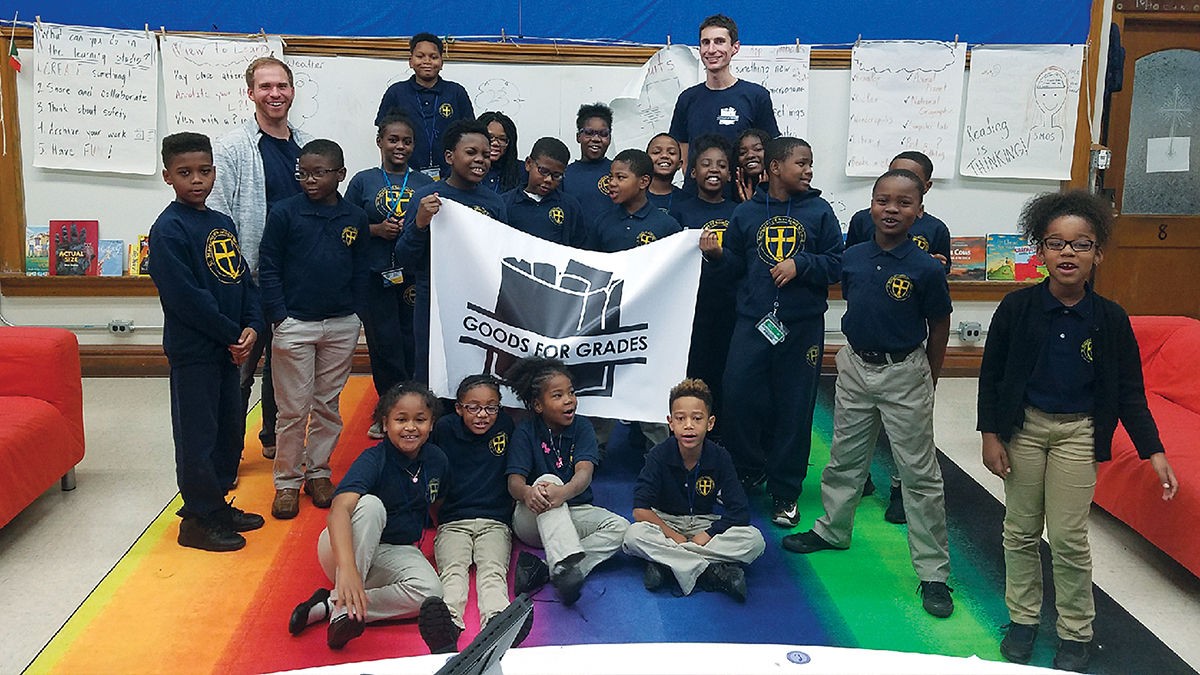With less than a decade of professional work experience under his belt, Matt Lally ’10 has ventured into territory many might postpone until closer to retirement. He’s the Founder of a nonprofit dedicated to bettering educational outcomes for at-risk youngsters; in addition, he’s funded a global effort to create a sustainable food source. Yet it’s clear his youthful enthusiasm is paying off for those individuals and communities in the crosshairs of his altruistic dreams.
While he is optimistic about his efforts, he is also in touch with the realities of running a not-for-profit and a start-up business.
As Nielsen’s Associate Director of Growth and Strategy, Lally refers to himself as a market research consultant by day and nonprofit volunteer evenings and weekends. “Philanthropic work has always been important—it’s a value instilled from an early age,” he said. “My father ran his own charity for a decade (saving outcast dormitory furniture from landfills and delivering to Appalachia, the Caribbean, and Central America). I’ve always had exposure and interest in philanthropic activities.”
Networking led to meeting other young professionals with similar aspirations. One such acquaintance was exploring how he could have an impact on educational systems. The two were shocked at the statistic that one out of every eight students misses a month of school per school year. In 2012, when Chicago was the focus of national attention with high school graduation rates hovering around 50 percent, the duo began researching the issue—speaking with educators, administrators, and those with experience with existing programs and their shortcomings. “I believe education is the foundation and background for a successful life,” he said. “It was an area in which I wanted influence.”
Through research, they narrowed their focus to an approach that had little or no attention: A partnership geared toward elementary school parents that they named, “Goods for Grades.” In 2014, they attained their 501c3 and launched the inaugural program in 2015 with one school on Chicago’s southside. There, regular attendance (and later they added good behavior) results in rewards to the parents of actual goods or open-ended opportunities like a gift card to a restaurant or for purchasing clothes.
As happens through altruistic efforts, he’s learned more than he’s given over the course of three years. What he found was that the lackluster attendance of children was not because it was inconvenient to get them to school or that parents didn’t believe school was important.
“For some of them, it’s a matter of ‘I have to be at work at 6:00 a.m., so I rely on an older child to get them to school.’ We have to take into account all the different circumstances and then what would it take to place importance on overcoming that barrier,” he said. “We have learned a lot—most importantly, understanding the problem from their perspective. No one wants someone from the outside telling them how to raise their kids.”
As if one such effort wasn’t enough, Lally more recently became an investor in a sustainable chicken farm in Uganda. The relationship formed as he sat on the Chicago board of Accumen, “a global community dedicated to changing the way the world tackles poverty” by employing business practice and models and changing the traditional charity approach to something more sustainable. A business plan, cost analysis, and proforma led to Lally providing them with capital.
“The chicken farm is a supply/demand opportunity for eggs. At the beginning of 2015, five families were selected to participate to be the caregivers and owners of the project,” he said. “It’s been a tremendous success. They’ve followed their revenue forecast and already payed back the loan. Structuring it as a loan—versus a charitable donation—brings a greater sense of responsibility.”
These sorts of bold endeavors take a little chutzpah, and Lally credits his days at Butler with building that trait. “Something that has always stuck with me that I learned at Butler: It never hurts to ask. That can play out in a lot of different ways, but it’s a mentality. If there’s something that you want, the worst that can happen is you get a ‘no.’ Being vocal about what you want is going to have a positive impact. Also, if you have a real passion, you need to share that with as many people as you can.”
To learn more about these respective projects and how to support them, visit GoodsForGrades.org or gofundme.com/emmy039s-empathy.


